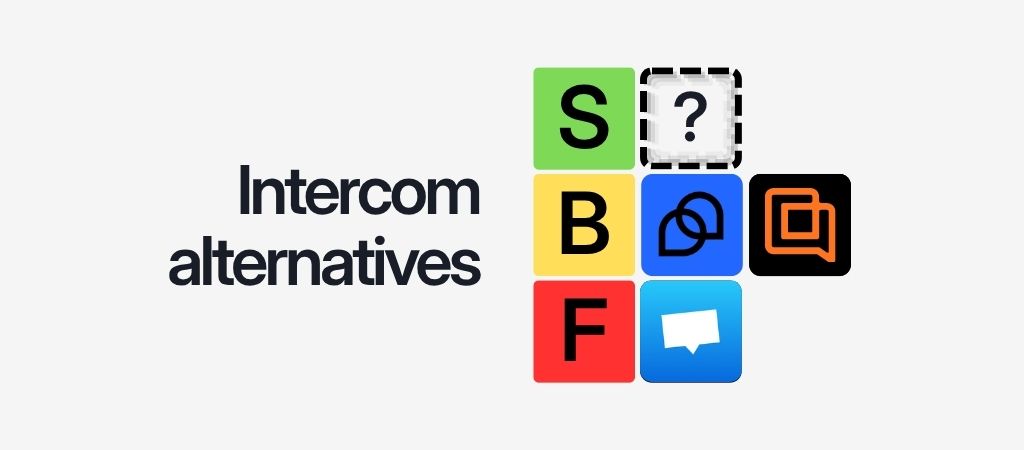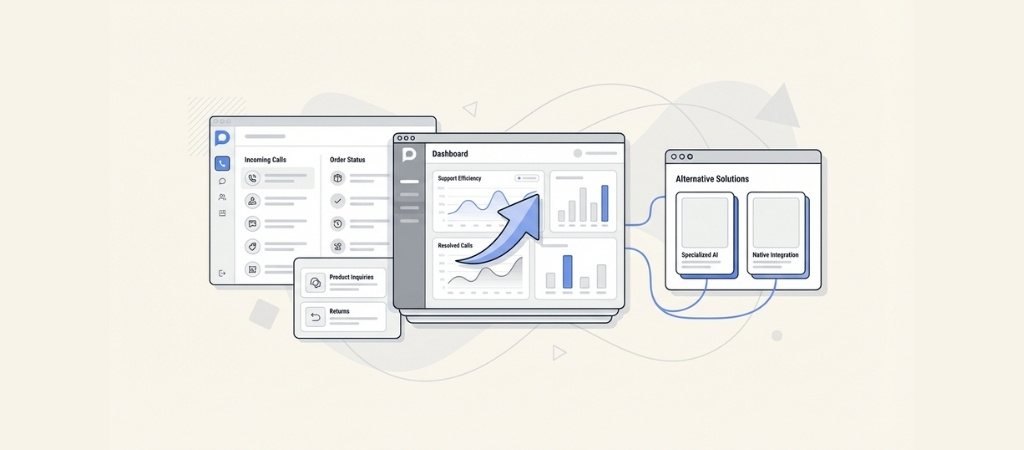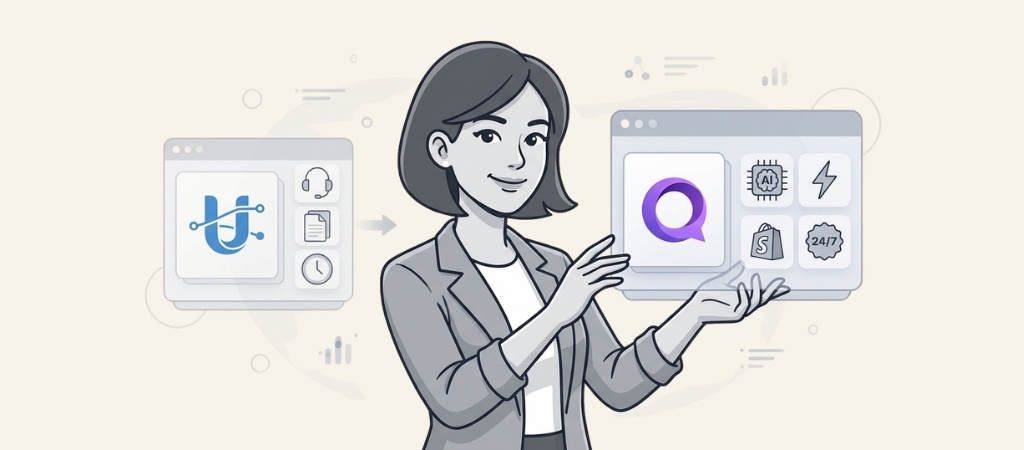In this guide I will help you find the best Intercom alternative to use for your business in 2025.
Short answer:
The best Intercom alternatives are:
- If you just want live chat, use Tidio. (Starts at $29/month)
- If you are a larger business, I would recommend Zendesk. (Starts at $55/agent per month)
- If you need AI phone support for Shopify, use Ringly.io. You only start paying for Ringly when your AI phone agent automates at least 60% of your support calls.
Ringly averages a 73% resolution rate on over 2,100 active Shopify stores.
See the TL;DR table below for a quick comparison from all the tools that I tested.
Below the TL;DR table you will find an in-depth review for every single tool as well.
How I tested each tool: stopwatch from signup → onboarded. I installed the tool on a Shopify store, installed all the basic features, just the ones that I need to get started.
Note: All of these tools cover the basics. I’ll only go over standout features that are unique to each tool specifically.
TLDR of Intercom alternatives
1. Ringly.io: AI phone support for Shopify stores
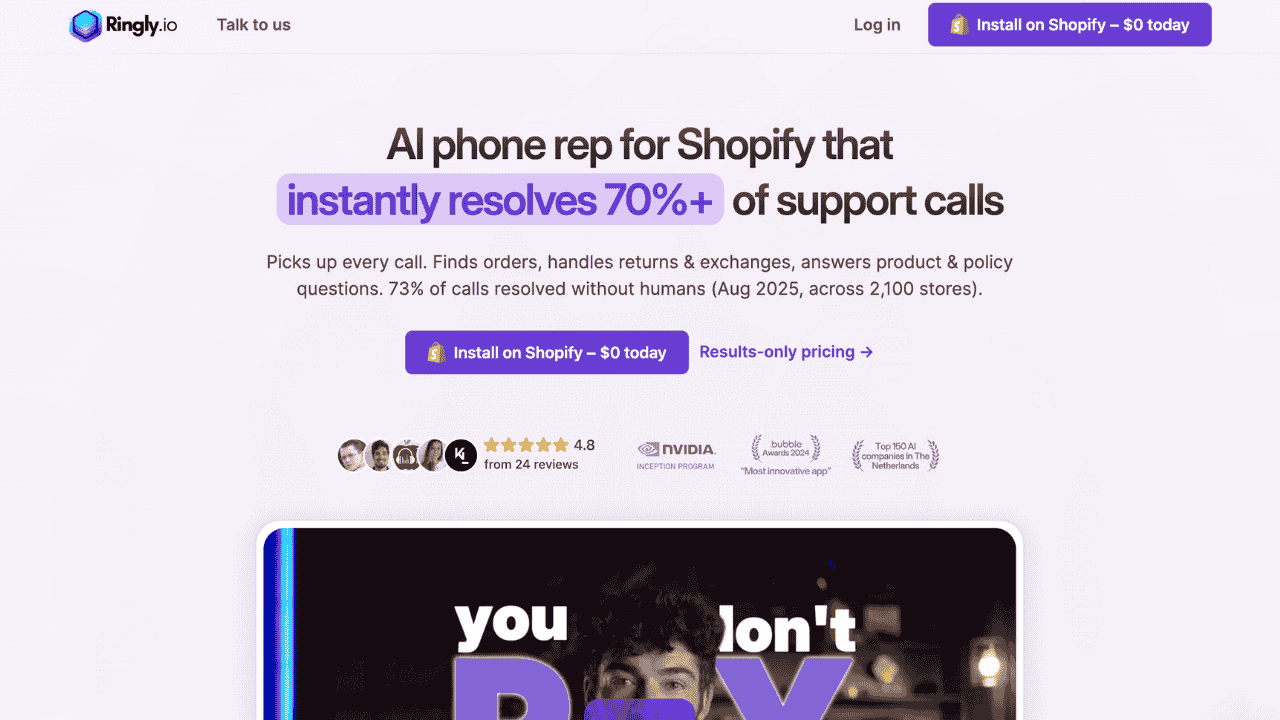
Best for: Shopify stores looking for the best way to offer 24/7 AI phone support. Ringly resolves on average ~70% of support calls on its own.
Did you know that 83% of your customers want to call you when they need help? People are less likely to buy when they cannot reach you
How it went when I tried setting up Ringly:
After I installed the Shopify app, the only thing I had to do was to upload my data to the knowledge base. (website was uploaded automatically)
After I did that, I could already speak to my agent via a web call.
Setting it live was as simple as picking a phone number with my area code from the dashboard. I was able to connect the number with 1 click. (The number is also free and included)
There was not really anything else to the setup.
They claim that out of the box, their agents resolve an average of 73% of support calls. They back that up with data from over 2,100 active Shopify stores.
Signup -> onboarded took only 4 minutes and 12 seconds. Most of that time was spent waiting for the knowledge to be uploaded.
Over the first 2 weeks I used it (14-day free trial), it resolved 76% of my calls on its own.
The rest of the calls were escalated to a support ticket by my agent.
(update: the more calls you get, the smarter it gets. As of today, my resolution rate is 79%.)
Standout Features (pros):
- Very easy setup (almost none)
- Pay on results pricing
Pricing is on a results basis; you don't pay until your agent has at least a 60% resolution rate
Shopify integration is native. It will allow your agent to solve order status and refund requests on the phone.
Reviews are overall very positive, mainly because of the results-based pricing. If you don't pay unless you get results, every customer gets results.
Cons:
- Phone support only
What’s unique about Ringly is that it is the first AI phone support tool built for Shopify.
Editor’s note: Want to hear some sample calls made for your Shopify store?
- Just paste your store URL
- Get sample calls in under 20 seconds (no email required)
- Listen to demo calls for my store
2. Zendesk: Enterprise-grade support infrastructure
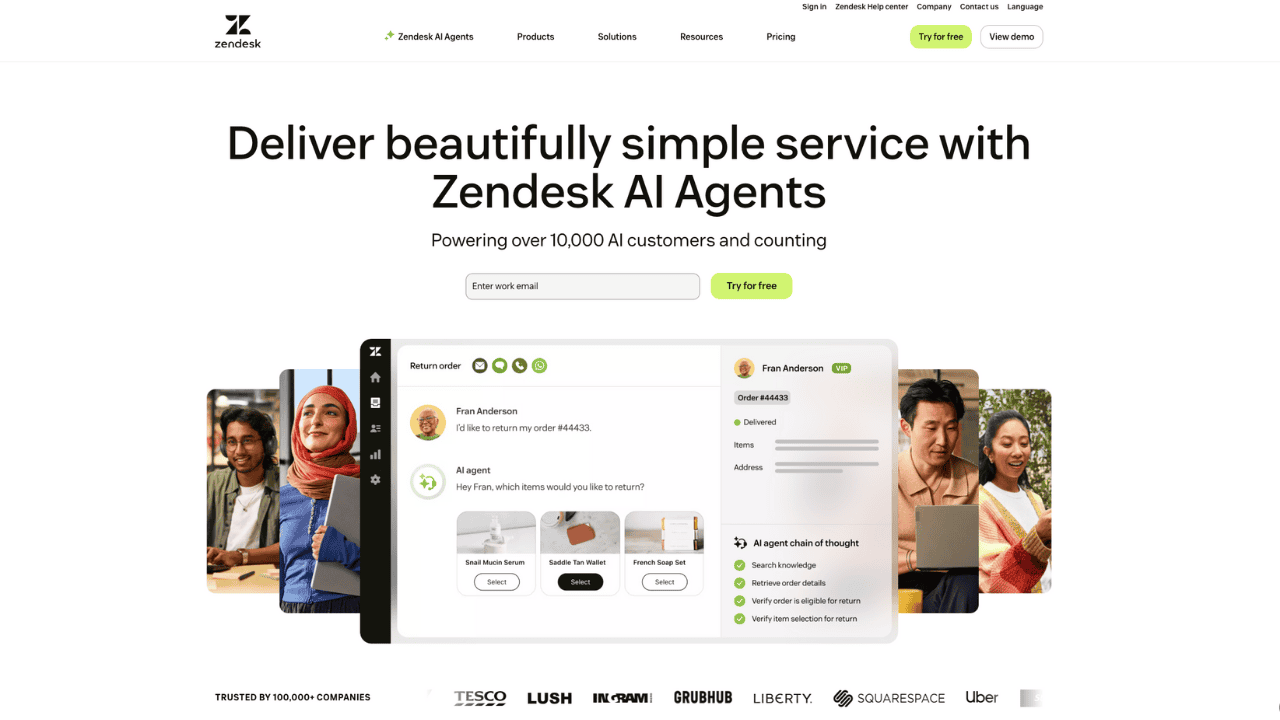
Best for: medium to large e-commerce businesses that need reliability.
How it went when I tried setting up Zendesk:
After signup they will guide you through all the steps required to get started. They immediately ask for your website to start training the AI agent.
After that, you will be guided through a demo ticket resolution, which was very helpful. Especially since the dashboard is a bit more complicated.
When using Zendesk over a period of 2 weeks, I mostly felt that I was not using most of the features.
So if you are a smaller to medium-sized ecommerce brand, I would not recommend this tool for you.
The product functions perfectly, though, and there were some things, like the macros feature, that I liked.
The AI agent is also decent, but I would say it not not as capable as some other agents that I have tested. It is mostly for filtering out the really simple tasks.
Signup -> onboarded took me exactly 17 minutes and 51 seconds. In that time, I set up the AI agent, invited my team, and set up all the routing rules for tickets.
Standout Features (pros):
- Scalable
- Older and proven platform
- A big ecosystem with other tools
Pricing starts from $55 per agent per month.
Shopify integration (is available through a native Shopify app that syncs order/customer data into tickets.
Reviews are not the best, on Trustpilot, they only score 1.9 out of 5, but on Capterra, they score 4.4 out of 5.
A common complaint is the lack of support available, billing issues, and people who feel they were misled.
On the flipside, some people say their support and platform are great, so reviews are mixed on several occasions.
Cons:
- Difficult to use
- Per agent pricing will get expensive fast
What’s unique about Zendesk is that you will probably never grow out of it.
3. Gorgias: E-commerce-native customer service
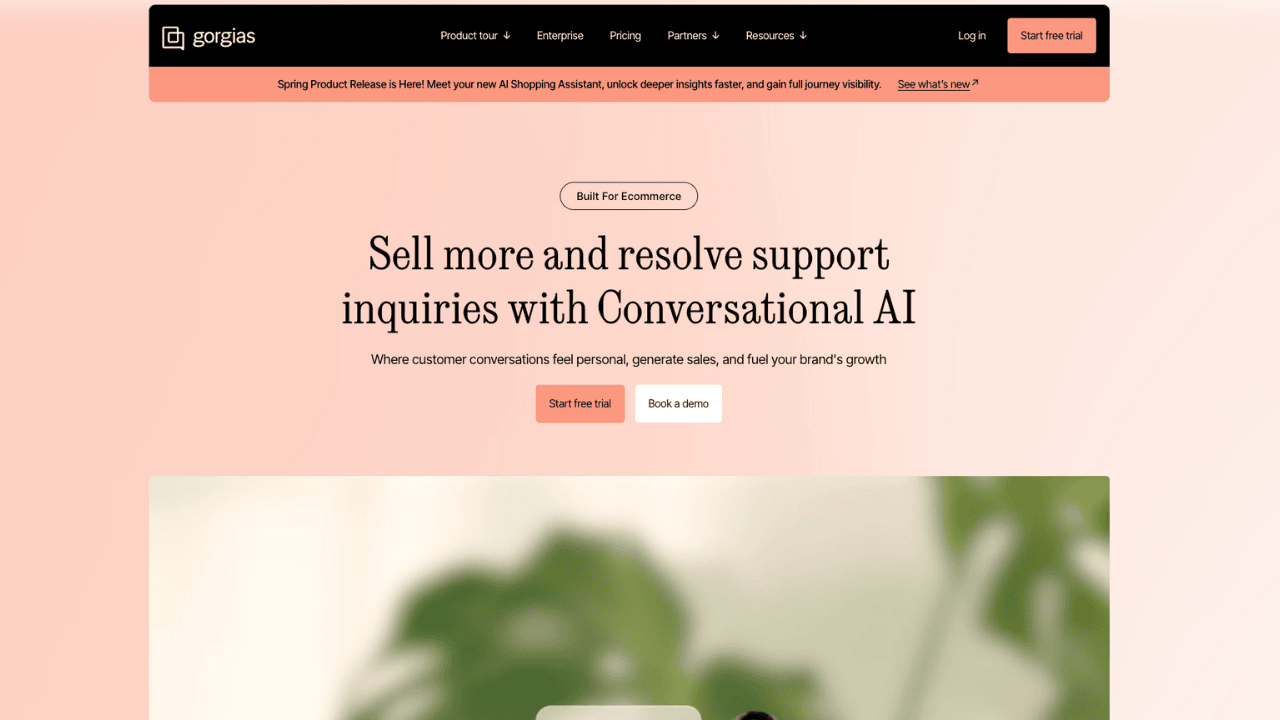
Best for: stores that want support that integrated with Shopify
How it went when I tried setting up Gorgias:
After the signup, I was led straight to the onboarding. They first ask you to connect your email and Shopify store, which is easy to do, and they have good documentation.
After the setup, navigating the platform was a bit difficult. I think the large number of features can be overwhelming.
What stood out most to me was the convert feature, which is something I have not seen anywhere else.
This feature will keep track of how much money you are making from your support. Every support tool should have this, in my opinion.
Setting up the AI agent was almost no setup at all, after I already connected my Shopify store.
Signup -> Onboarded took me exactly 9 minutes and 43 seconds. You can expect about the same for small to medium Shopify stores.
Standout Features (pros):
- Support profit tracking
- AI Analytics
Pricing starts at $10/month for 50 tickets, and scales according to the number of tickets required.
Shopify integration is native (Shopify app). And syncs customer information like orders and refunds from Shopify automatically.
Reviews are mixed; on Trustpilot, they score 3/5, and on Capterra, a 4.6/5. Most negative reviews focused on the price being too high or complaints about Gorgias' cold outreach.
I could not find a lot of complaints about the quality of the product. But there were quite a few 1-star reviews from people complaining about the in-app support. (A little ironic for a support tool)
Cons:
- More expensive per ticket
- Dashboard feels a bit outdated
- Lacks good phone support
What’s unique about Gorgias is that it connects support to revenue. And, they are the most popular and proven for Shopify merchants.
4. Tidio: Affordable live chat with AI automation
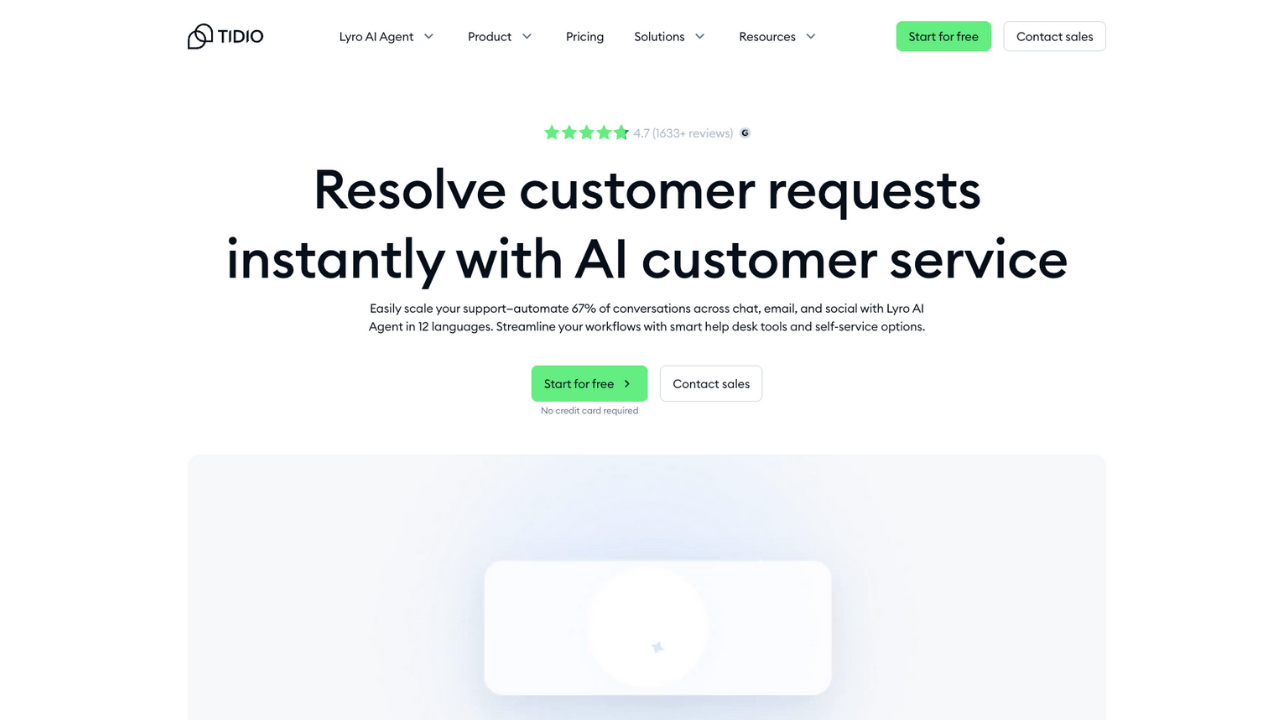
Best for: smaller to medium ecommerce stores that need a simple chat + bots on a budget.
How it went when I tried setting up Tidio:
After the signup, they asked me quite a lot of questions to make sure the experience was customized for my use case. This felt reassuring, and they come up with things that you maybe would not have come up with yourself.
Installing the chat widget is very simple with the Shopify plugin. And it looks much better than some other tools.
Their main feature and the biggest part of why I like Tidio is their AI agent.
It is already pre-trained on your use case, and there are way more features available to get a higher AI resolution rate.
The agent will also become smarter the more you use it.
The ticketing part was also very good, and just ike the chatbot, already customized to my use case. They set up categories for order status and other intents.
Their analytics are also one of the best I’ve used. They give you a clear overview and very good insight into how your team and AI are performing. And, the handoff between those two is almost perfect.
Signup -> onboarded took me only 9 minutes and 34 seconds. In that time, my customized chat widget, AI chatbot, and knowledge base were completely set up.
I also used some of that time to set up what they call ‘flows’, which can be used for sales and support use cases too. During the 2 weeks using this product, this feature was very useful, so I set up some more of these flows afterward.
Standout Features (pros):
- No code chatbot builder
- Mobile app
- Cart abandonment recovery
Pricing starts at $29/month, but they do offer a free plan too.
Shopify integration is a native app that will source customer and order info from Shopify and trigger automations.
Reviews are decent, on Trustpilot, they score a 3.7/5, and people are very enthusiastic in the reviews. But there are also complaints about bad support. On Capterra, they score even higher, with 4.7 stars out of 5.
Cons:
- Not a lot of analytics
- Not very scalable
What’s unique about Tidio is that it has really nailed live chat for e-commerce, which is its main focus. No-code ecom chatbots at entry-level pricing.
5. Help Scout: human-focused support platform
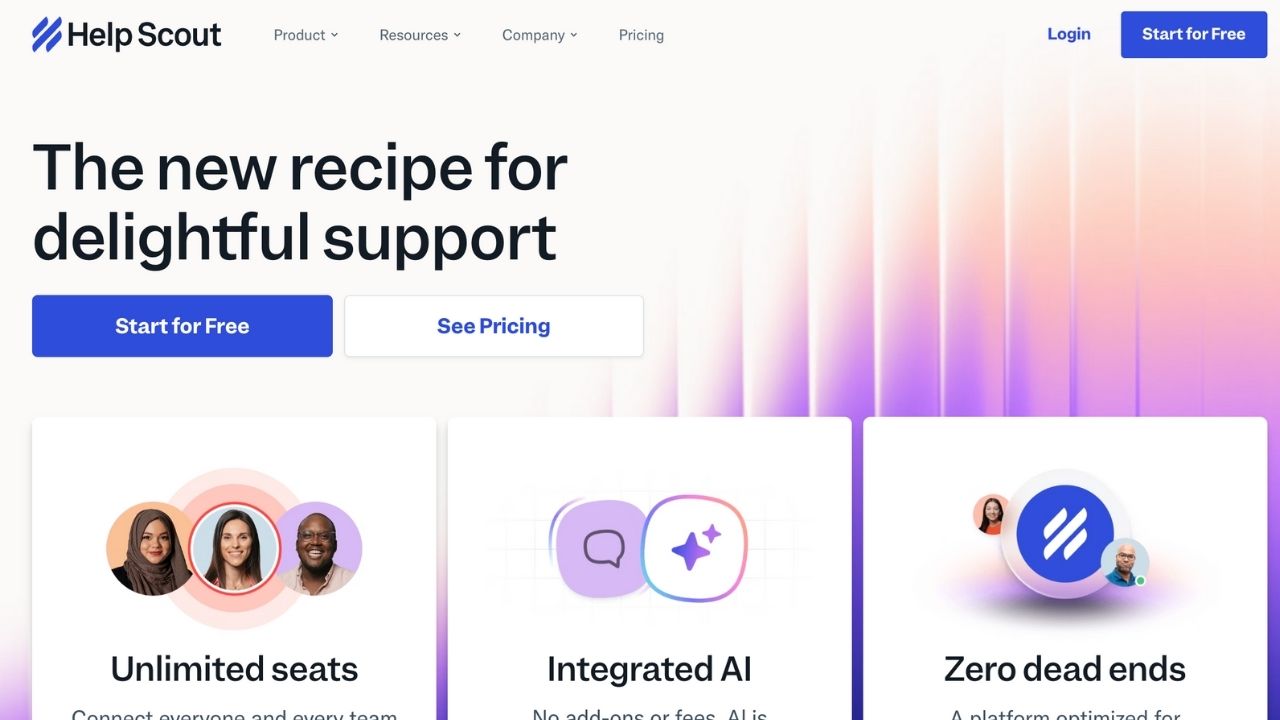
Best for: Teams that need a clean email support experience.
How it went when I tried setting up Help Scout:
After I signed up, the only onboarding I got was some explanations of where to find certain features. They also offered me to sign up for a tour, where they walk you through the product.
The layout of the platform differs from others. For instance, the navigation bar is at the top of the screen and horizontal.
The messaging inbox was a bit difficult to oversee compared to other platforms I tested.
So, navigating that part and responding to tickets is not the best, but still pretty solid.
Overall, I did manage to get the platform to function pretty easily. But I can imagine that if you have never used a similar tool before, you would need to schedule a demo to get started.
Signup -> onboarded took me 13 minutes and 14 seconds. Connecting to Shopify was the hardest part. I have not fully set up my documentation yet, just the most basic FAQs. If you don't have that set up already, it will take some extra time to get started.
Standout Features (pros):
- AI features are actually useful, unlike some other platforms
- Included hosted documentation
Pricing starts at $20/month per user.
Shopify integration will give access to customer data and allow AI/human reps to handle everything without leaving Help Scout.
Reviews get a score of 3 /5 on Trustpilot and a 4.4 /5 on G2. Most negative reviews I could find were related to missing features.
Ease of use is the most common positive review theme.
Cons:
- Not really special, poor onboarding
- Missing some features that other tools offer
What’s unique about Help Scout is that it is easy to use while still being scalable. Unlike tools like Zendesk.
6. Crisp: budget-friendly all-in-one solution
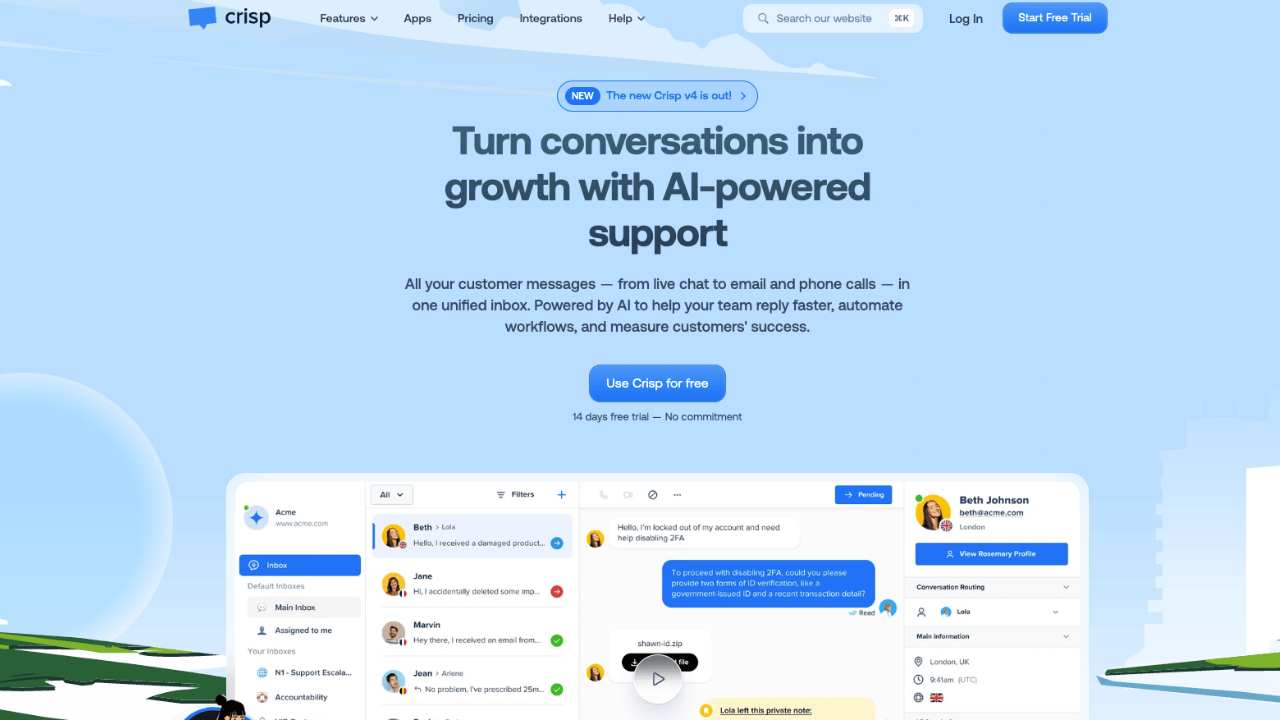
Best for: teams on a budget that need chat, bots, inbox, and KB in one place.
How it went when I tried setting up Crisp:
Immediately after the signup, I was met with an onboarding page with a lot of information and tasks to get done. This was a bit overwhelming. (in total, there were 26 steps)
Adding the chat widget to my website was easy to do with the Shopify plugin. This was also the case for connecting my other channels, such as WhatsApp, email, and Messenger.
The onboarding goes quite a lot further than most other tools. For instance, they make customizing the web widget also a part of the onboarding.
After 2 weeks of using the tool, I was very satisfied with the overall feel of the platform and how the inbox and ticket management are set up. But the chatbot disappointed me.
They give you a template when you build your first chatbot, but the no-code flow builder, which is required to set up a chatbot, feels a bit clunky.
I would have much rather had a tool with a simpler setup, and that was already pre-trained on a specific use case.
Signup -> onboarded took me quite a while, and I did not even finish all of the onboarding steps.
In total, I spent 24 minutes and 23 seconds setting up my live chat and AI chatbot. Plus, training my knowledge base and setting up some automations and routing rules.
Standout Features (pros):
- Generous free tier with unlimited conversations
- Multichannel at a low price
Pricing starts at the free tier, paid from $25/seat per month.
Shopify integration is a native Shopify app that syncs customer info and other shop data with the helpdesk. It will also allow you to connect the web widget more easily.
Reviews are not always positive. On Trustpilot, they only score 1.9 stars out of 5, and on Capterra, they score a 4.6 /5.
People are positive about the help desk and the support they offer, but there were also a lot of mentions about bugs, and people complaining about bad support. So on those topics, people are divided.
Cons:
- No advanced analytics
- Feels more “all-in-one” instead of best-in-class
What’s unique about Crisp is that it offers unlimited conversations (with limited functionality) for free. So you only have to upgrade if you want the better features, but you will probably end up doing so.
7. Kustomer: A more advanced solution
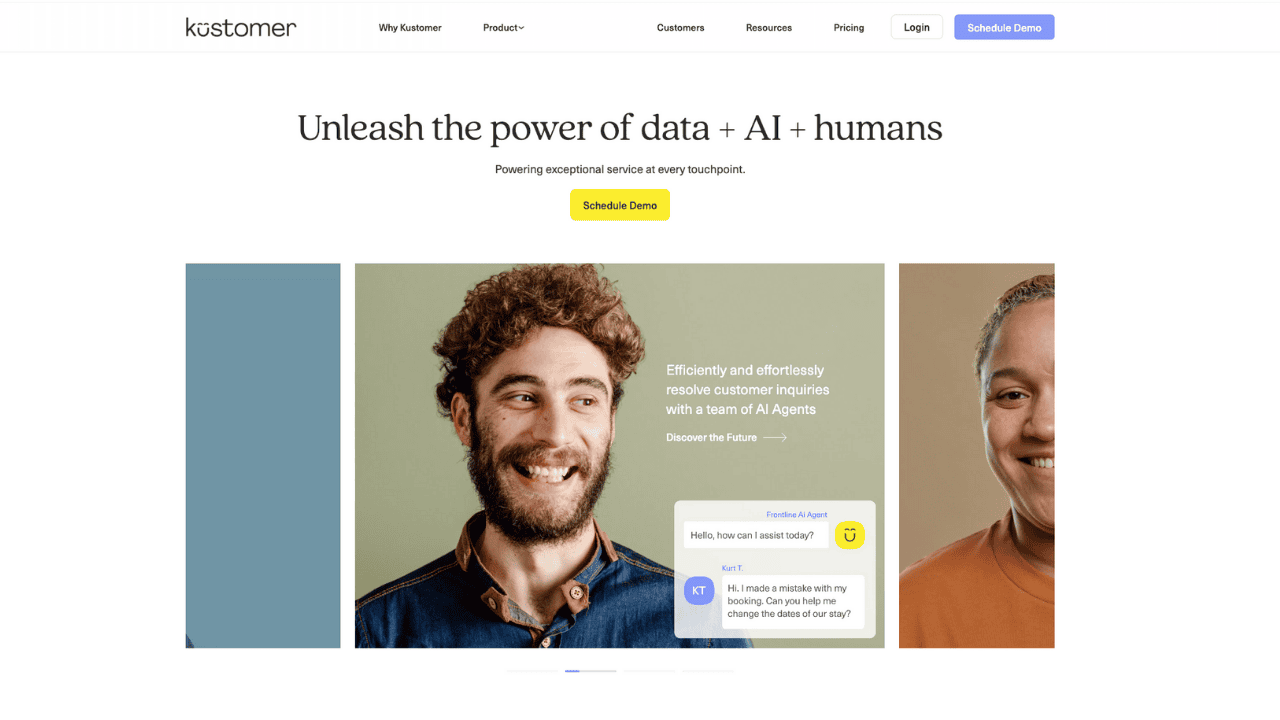
Best for: larger teams that need a more scalable solution.
How it went when I tried setting up Kustomer:
Kustomer is a done-for-you solution, so you will have to pay for the setup.
Standout Features (pros):
- Gives a clear, full overview of a customer's journey
- Hands-off experience
Pricing is custom; you need to request a quote based on your needs.
Shopify integration is a native Shopify app; they do have a lot of integrations, but a lot of them are custom.
Reviews are not the best, on Trustpilot they score a 2.4/5, most of the complaints are about the AI chatbot being, quote: “stupid”.
Cons:
- Difficult to use
- Can become expensive with custom setup and pricing
What’s unique about Kustomer is that it organizes support in a completely different way; instead of tickets, they organize it by people.
8. LiveChat: Conversion focused chat solution
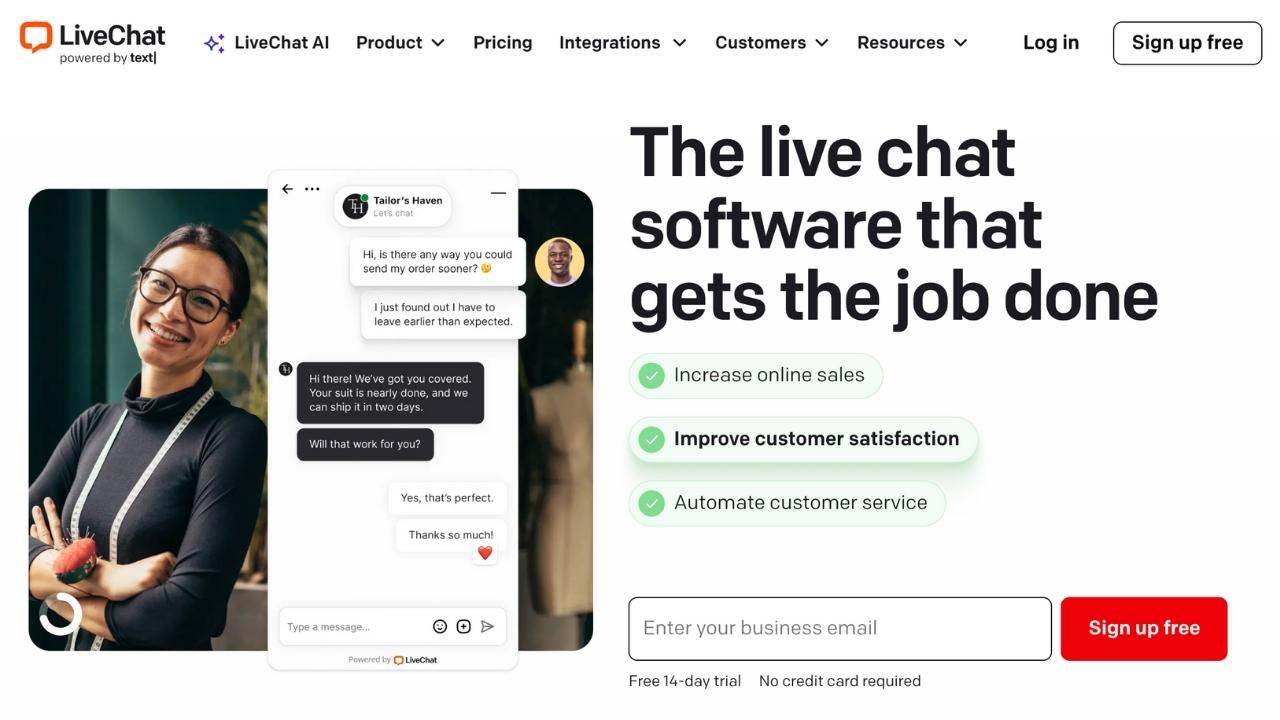
Best for: teams that use chat as a sales channel and need conversion tracking.
How it went when I tried setting up LiveChat:
Directly after signing up, they asked me to install the code for the live chat in the header, before I even got to the dashboard. I used the Shopify plugin to install that automatically.
After that, they walk you through an onboarding flow. They make you do exercises like answering demo tickets and testing the knowledge of your chatbot. Everything that I set up was also guided by a tour.
The UI looks really good, and I did not have to set much up for the chat feature since that was already installed. So I could immediately start setting up my chatbot and automations.
The chatbot is quite good, especially for e-commerce support. It is also easy to set up because most of it is pre-trained.
There are some features, like custom answers, that are locked for the lower tiers.
After using it for 2 weeks, there were no real flaws. And especially having the options for whatsapp, SMS, and Facebook messaging made me more available to my customers.
And thanks to their insights, I also have a good overview of the status of my CX.
Signup -> onboarded took me only 13 minutes and 59 seconds. This setup included setting up my agent, escalation rules, and adding the live chat to my website.
Standout Features (pros):
- Sales assistance for reps
- UX is good for visitors and reps
Pricing starts from $20 per agent per month. (14-day free trial)
Shopify integration is available with their Shopify app, which will share product links and cards from the Shopify catalog as well as order info.
Reviews are average; they score a 2.8 out of 5 on Trustpilot and a 4.6 out of 5 on Capterra.
Most negative reviews are about the pricing or billing issues, but the reviews about the product itself were generally positive.
Cons:
- Mostly focused on chat
- Add-ons will make it more expensive
What’s unique about LiveChat is that they are more focused on conversion and sales in chat support. So you could end up making money from support instead of it costing you money.
9. Re:amaze: E-commerce support specialist

Best for: Shopify brands that need unified channels with order actions in one dashboard.
Standout Features (pros):
- Built for ecommerce
- SMS support
Pricing starts at $29/seat per month
Shopify integration allows you to view and edit order info directly from the helpdesk, and has some data integrations too.
Reviews are good; they score a 4.5 out of 5 on Capterra. People love the self-service approach, and it works with multiple e-commerce platforms.
Difficulty of setup was the most common complaint I could find.
Cons:
- Not a lot of AI is involved in the product
- UX is not the best
What’s unique about Re:amaze is that it offers multichannel support at a low price.
What to look for in an Intercom alternative (5 things)
- Make sure the tool you pick connects to your ecommerce platform.
- Does the tool offer multiple channels?
- Think of how much of your support AI can take over, and what tool offers that capability.
- Can the tool you pick scale without having to hire more humans?
- Does the pricing model fit your business?
Some context on Intercom: Intercom can be divided into 2 tools, Fin.ai and their support platform. Fin.ai started as a feature inside of Intercom, but later on became a separate product.
But Intercom still lacks features around AI phone support.
Conclusion: choose the right alternative to Intercom for your ecom store
Switching from Intercom is not just about finding a cheaper alternative. The goal should be to give your customers the best experience possible.
If you want AI phone support, Ringly.io is the best option.
If you want live chat, Tidio and LiveChat are the best options
If you are a large brand, I would recommend Zendesk or Kustomer
While deciding, keep your specific ecommerce use cases in mind and make sure the support platform you pick will:
- Make your customers happier
- Not cost you a fortune
FAQs
Does Ringly offer a guarantee? Yes. You don’t pay until we resolve at least 60% of your calls autonomously.
Does Ringly work with my current helpdesk? Yes. Ringly can escalate tickets to your existing helpdesk, and you have full control over what gets escalated. Ringly works with platforms like Gorgias, Richpanel, and others.
How does the AI handle order tracking? Our AI pulls data directly from Shopify to answer "where is my order" questions on every live phone call.
Can I forward my existing number? Absolutely. You can use call forwarding to send your business calls to your team.
How do I get started? We offer a free trial so you can start without any risk.



